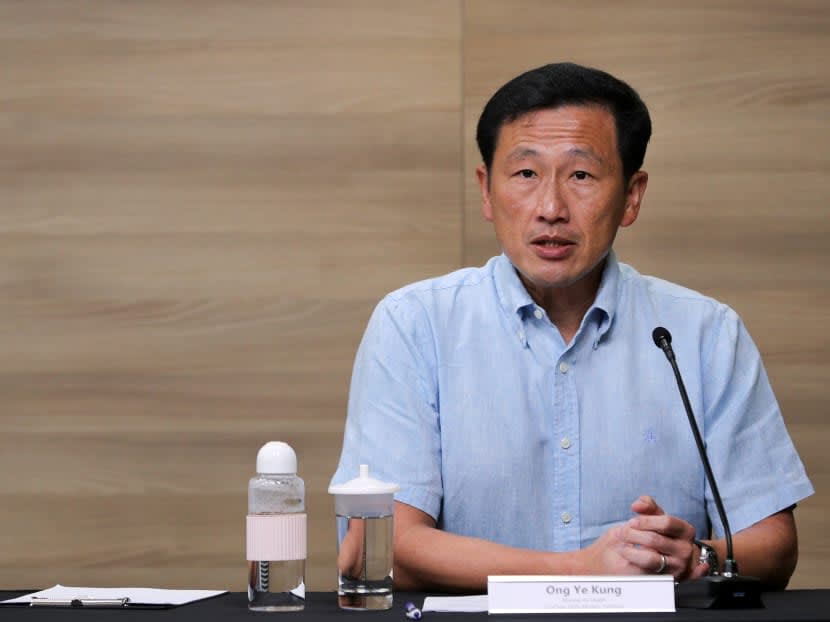Structural response required to repay 'business-as-usual debt', address needs of chronic patients: Ong Ye Kung
SINGAPORE — A long-term "structural response” is needed to treat non-Covid-19 patients who have chronic illnesses and who may not have had close medical follow-up over the last two years due to the strain of Covid-19 on the healthcare sector, Health Minister Ong Ye Kung said.

- A long-term "structural response” is needed to treat "business-as-usual" patients, Health Minister Ong Ye Kung said
- These are patients who did not have a close medical follow-up over the last two years due to the strain of Covid-19 on the healthcare sector
- The opening of three new nursing homes and freeing up of more hospital beds were among the measures announced
- Mr Ong said there are no plans to ease Singapore’s vaccine-related infection controls yet
SINGAPORE — A long-term "structural response” is needed to treat non-Covid-19 patients who have chronic illnesses and who may not have had close medical follow-up over the last two years due to the strain of Covid-19 on the healthcare sector, Health Minister Ong Ye Kung said.
“They are what we call business-as-usual patients. We now have a business-as-usual debt that has to be repaid one way or another,” Mr Ong said during a press conference by the national Covid-19 task force on Thursday (March 24).
The minister, who was speaking from Kuala Lumpur in Malaysia, announced that three new nursing homes here will open in the Henderson Road area, Pasir Ris and Potong Pasir in April.
“This will help relieve a significant number of patients from hospitals and these are patients currently in hospitals waiting for their nursing home places,” he added.
Critical cases remain “very manageable”, with fewer than 30 such patients warded in intensive care units within hospitals as of Wednesday.
Absentee rate among healthcare workers due to Covid-19 has also declined from 2.7 per cent in early March to about 2 per cent now, Mr Ong noted.
However, emergency departments still face significant strain, with many patients seeking hospital care on a daily basis.
To address what Mr Ong calls the business-as-usual debt, the Government will progressively shift its focus back to serving patients in hospitals by freeing up hospital beds and manpower that had been ring-fenced, in order to expand the capacity for the long term.
"We will also continue to make full use of Covid-19 treatment facilities," Mr Ong said.
One such facility at Tampines will be converted back to a nursing home around April and Sengkang Community Hospital, which has been serving as a treatment facility, will also be reconfigured to accept more non-Covid-19 patients.
The Government will continue existing collaborations with private hospitals such as Mount Alvernia Hospital, Parkway Hospitals and Raffles Hospital, which will help admit and manage physically stable Covid-19 patients from the emergency departments, Mr Ong said.
HOW WILL THE UNVACCINATED BE AFFECTED?
When asked by TODAY about how the easing of restrictions will affect the unvaccinated, Mr Ong said that there are no plans to ease infection controls tied to vaccination yet.
However, he said that when the “hospital situation is better” and a great majority of Singaporeans and the population is well-protected, they will then, in turn, be able to protect a small minority who remain unvaccinated.
At present, he said that 2.3 per cent of Singapore’s adult population is not fully vaccinated.
“That time, I think, will come and we will continue to monitor the situation and (decide) when we can moderate or step down the (restrictions).”
For now, he highlighted again that hospitals are busy, with much of the workload coming from non-Covid-19 patients.
“This is also a time when we don't want to add additional burden to the hospitals.”
Although the Omicron coronavirus strain is less severe than the Delta one, Mr Ong said that people who are partially or not vaccinated are more likely to fall very ill if they are infected.
He disclosed that people who are not fully vaccinated account for about a quarter of severe illnesses, as well as patients in intensive care units, and deaths. ADDITIONAL REPORTING BY LOW YOUJIN











